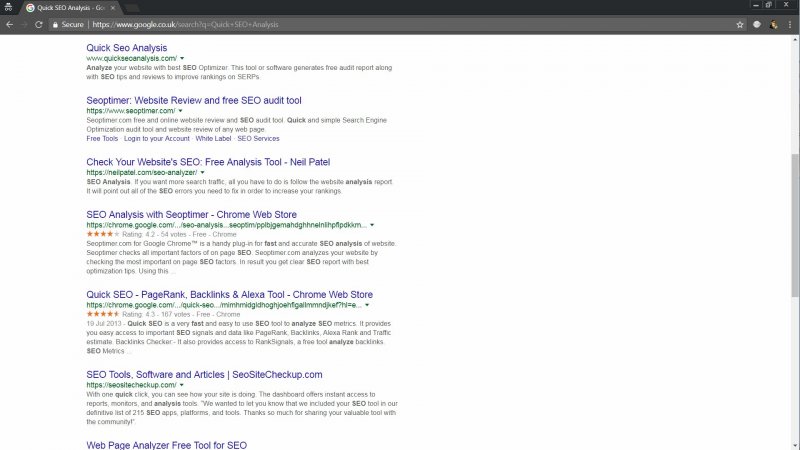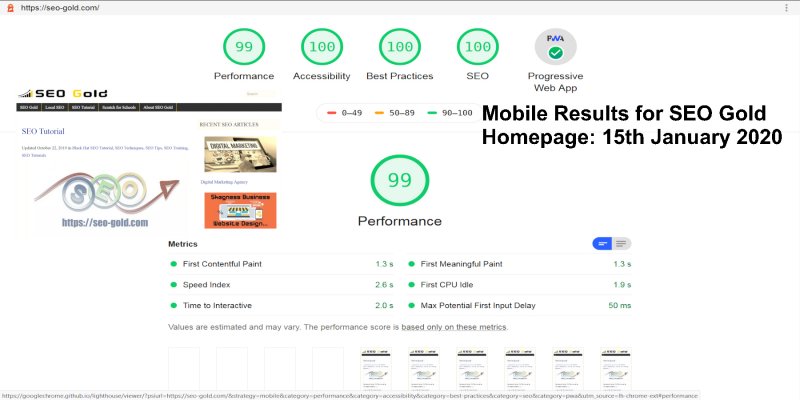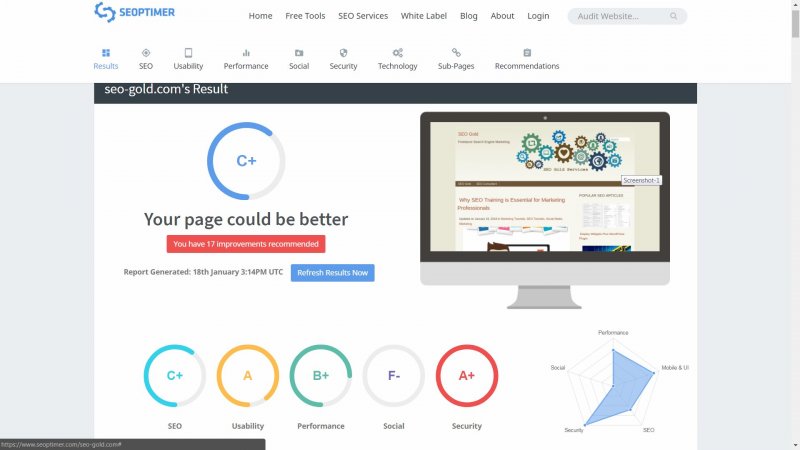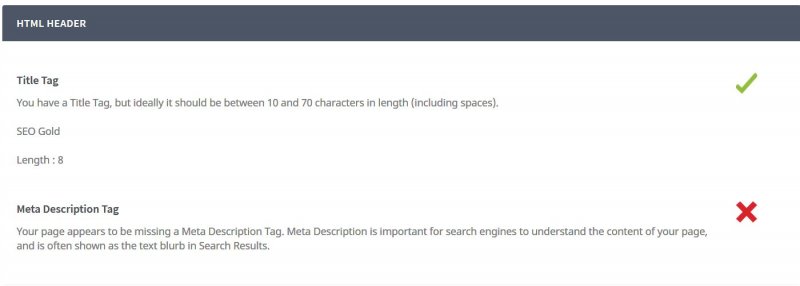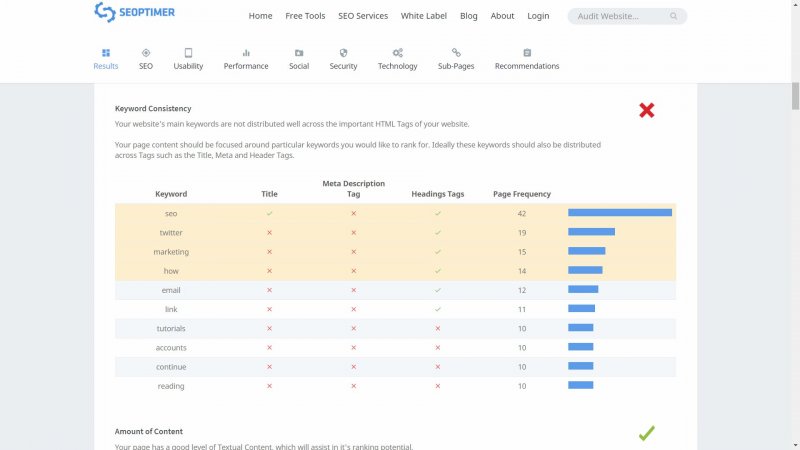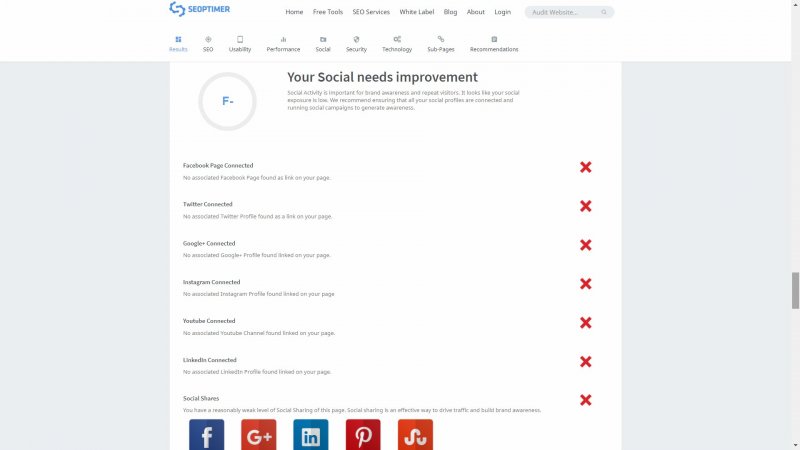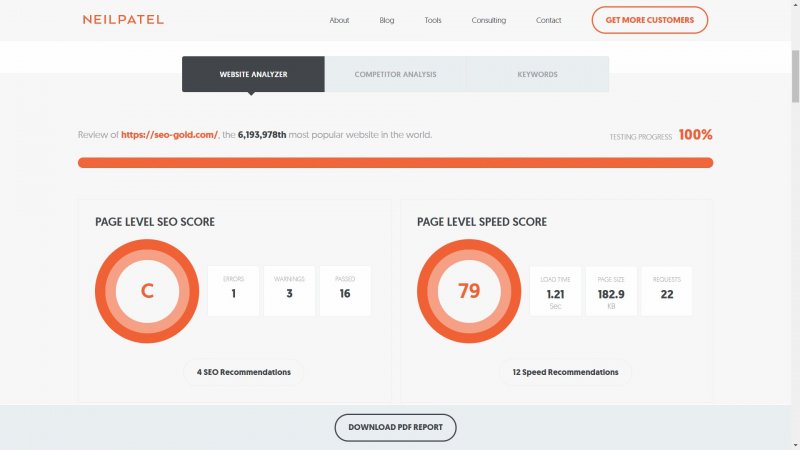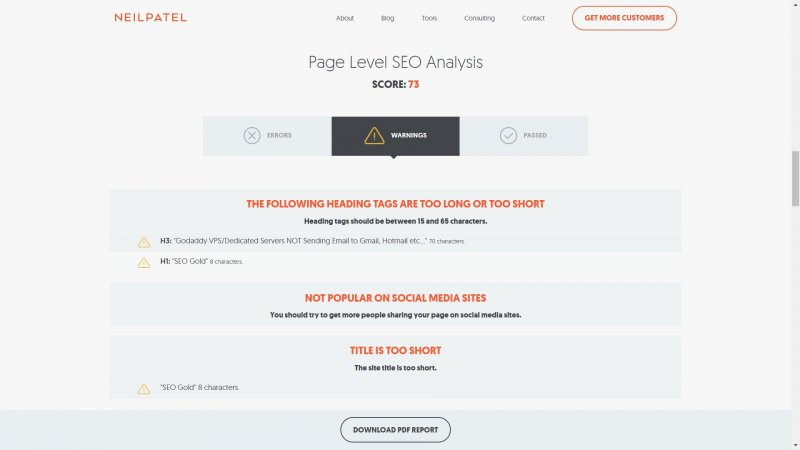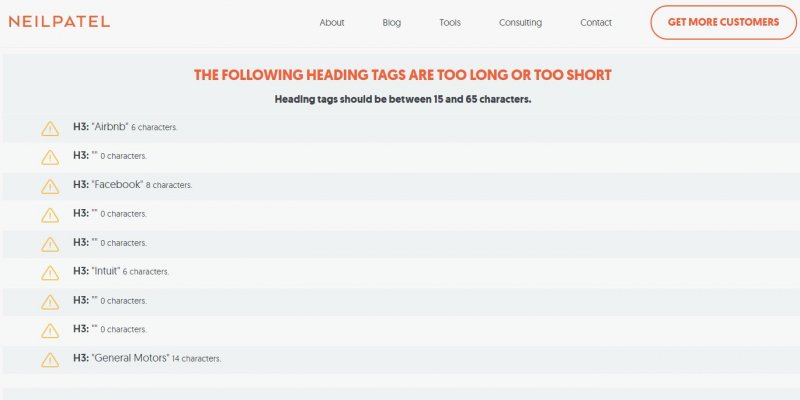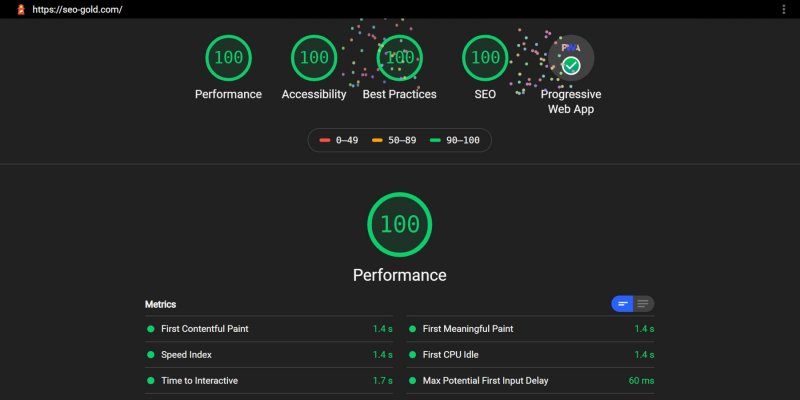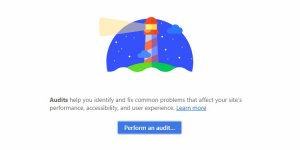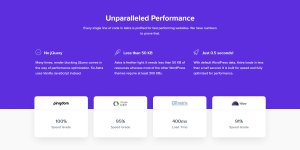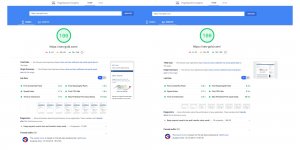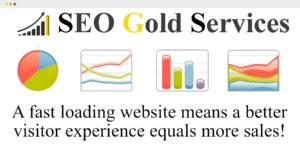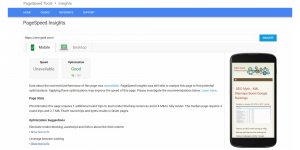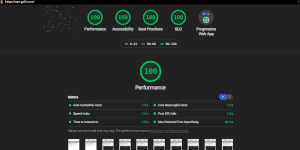I was thinking about writing an article about manually performing a quick SEO analysis of a website to see if a business would benefit from hiring an SEO expert and the first step was a Google search for “Quick SEO Analysis” which is dominated by quick SEO analysis tools rather than how to quickly analyse a site.
I had no choice but to test a few of the free SEO audit tools by running this websites homepage (https://seo-gold.com/) through the SEO tools to see how good they are.
I have over 18 years SEO experience, I built the WordPress SEO theme this site runs (it’s the best WordPress SEO theme available) and most of the site is optimised.
See the homepage Google Lighthouse MOBILE SEO Test Results below for how good I am at onpage SEO:
The Lighthouse MOBILE SEO tool tests are the hardest to pass, so if I can get close to 100/100 across the board for Lighthouse, any credible free SEO analysis tool should give my homepage good audit results.
Testing SEO Analysis Tools
The first SEO tool listed at http://www.quickseoanalysis.com/ expected registration, I’m not registering to test a tool that’s meant to be a quick test, (the Google search was for “Quick SEO Analysis”) so moved on.
I wouldn’t trust the audit results anyway, the domain doesn’t even run under https, looks like it might not have been updated for years.
Next result was for SEOptimer: Analyze Websites With Free SEO Audit and Reporting Tool
SEOptimer Review
SEOptimer didn’t expect registration so popped https://seo-gold.com/ into the URL form and waited for the results so I could review them.
Hmm, C+ with 17 improvements doesn’t sound particularly impressive!
Let’s look at a few of the SEO issues.
First thing listed is related to the HTML Header, it’s not called the HTML Header it’s the HTML Head section of the HTML code (it’s not a header). I wrote the above in January 2018, as I update this article in February 2020 I’m rechecking the SEO tool results for major changes, SEOptimer tool still calls it the HTML Header.
This mentions the title tag (real name title element, but most webmasters call it the title tag) and the meta description tag. On the plus side at least it didn’t complain at the lack of a meta keywords tag which Google has NEVER used as a ranking factor.
The title tag advice is “Title Tag: You have a Title Tag, but ideally it should be between 10 and 70 characters in length (including spaces).”
The home page title is 8 characters (too short according to the analysis tool).
This is misleading SEO advice, if a webpage is targeting a short keyword or phrase it needs to be whatever the length of the phrase is. There’s multiple pieces of useful SEO advice available regarding the title tag (not on the SEOptimer site), but this isn’t useful because we could have a perfectly optimised 80 character title tag or a title shorter than 10 characters.
SEOptimer Review Update 2020: my homepage title tag still receives this bad SEO advice!
The meta description tag advice “Meta Description Tag: Your page appears to be missing a Meta Description Tag. Meta Description is important for search engines to understand the content of your page, and is often shown as the text blurb in Search Results.”
The first part is wrong, Google doesn’t use the meta description tag “to understand the content of your page” (it’s NOT part of the Google’s ranking algorithm), in ranking terms you do NOT need a meta description tag set.
Google (like all major search engines) MIGHT use the meta description tag as the Google search description. Consider the meta description tag like an ad on Google, what you want is when a user reads the description they WANT to click it.
A good meta description tag is like good ad copy, since my home page is currently just the most recent 10 articles posted it isn’t targeting a specific SEO niche (I need to create a specific home page: creating a “pre-sales hire me page” is on the list of things to do :-)).
SEOptimer Review Update 2020: my homepage no longer receives this bad SEO advice, I’ve since added a meta description tag, in 2020 the SEOptimer audit tool gives a new SEO warning.
The meta description tag advice Your page has a meta description tag however, your meta description should ideally be between 70 and 320 characters (including spaces).
Local SEO Marketing for Plumbers and Electricians by SEO Gold.
Length : 62
This isn’t good advice, search Google for “SEO Gold” and my homepage is number one and Google is using the above meta description tag as part of the Google listing. I’m targeting plumbers and electricians who are searching for local SEO help.
Already this SEO tool is giving misleading and inaccurate information which could result in damaging changes in an attempt to get a higher ranking on the SEO tool.
Jumping through some other SEO misinformation we get to “Keyword Consistency“
Keyword Consistency
Your website’s main keywords are not distributed well across the important HTML Tags of your website.Your page content should be focused around particular keywords you would like to rank for. Ideally these keywords should also be distributed across Tags such as the Title, Meta and Header Tags.
SEOptimer Review Update 2020: my homepage still receives this bad Keyword Consistency SEO advice! The only change over the past 2 years is the keyword listed as important, they got worse!
It would appear the SEO tool simply counts usage of words and assume the most frequent words are what the webpage is optimised for (it’s keywords). So in my home page example the page is optimised for these keywords according to the SEO tool:
- seo
- marketing
- how
SEO optimisation isn’t that simple, you can have relatively low keyword density that’s targeted, so this output is highly misleading. All the red Xs suggest I need to put these keywords into the title tag, meta description tag and headings: that would be very bad SEO advice even if the tool guessed the correct keywords the page is targeting correctly.
There’s lots more misinformation output by the analysis tool, it suggests a robots.txt file, XML sitemaps, Google Analytics etc… are important SEO wise, they aren’t. There’s even a section on social media connections: see screenshot.
The SEO analysis tool results suggests linking to the social media accounts (Facebook Page, Twitter, Google+, Instagram, YouTube and LinkedIn) are SEO ranking factors. Linking to your social media accounts are not ranking factors and if you link to your social media accounts using standard links it will waste a lot of SEO link benefit!
SEOptimer Review Update 2020: SEOptimer still gives this bad advice, they’ve removed Google+ from the test (Google+ closed).
Every link from a page costs link benefit (PageRank (PR)) so you should limit unnecessary links. I don’t use YouTube or Instagram to promote this website, so why would I link to them?
As it happens I do link to some social media accounts, but only from articles visitors will spend time reading and from reading my content might want to know more about me: it’s highly unlikely a visitor will go to an archive section (category) and decide from that part of the site to visit my linkedIn profile or Twitter accounts!
My social media profile links are found within the Author Biography box below each article and link in a way that passes no SEO benefit (doesn’t waste PageRank). Google doesn’t directly use your Facebook, Twitter etc… activity in its ranking algorithm so there’s no SEO value linking to them.
I have SEO and marketing relevant Twitter accounts with up to 40,000 followers, if they added direct SEO value by linking to them, I’d link to them. Now there is a branding argument for linking to your RELEVANT social media profiles, when checking how trustworthy a website I’m not familiar with is, I’ll check them out of Facebook, Twitter etc… to see how many follow them and how long the website has been online: old social media accounts suggest trustworthiness. None of this has a direct Google SEO value though.
Don’t get me wrong, some of the information supplied by the SEO analysis tool is useful, but you need to be an SEO expert to know which parts are useful and what’s total BS. For a business owner with limited SEO understanding this will cause SEO damage as they try to improve their SEO score!
Other SEO Tools
I also checked the Neil Patel SEO Analyzer and it gave similar bad results as the SEOptimer tool in January 2018!
Looks like the Neil Patel SEO Analyzer Tool has been replaced with a more comprehensive SEO audit tool, I’ve not looked at it in detail yet (February 2020), so haven’t updated the information below (yet).
Neil Patel SEO Analyzer Review
The Neil Patel SEO Analyzer Tools results/advice is misleading, incorrect advice, basically bad SEO advice similar to the SEOptimer tool results like:
“Title tags are an important on-page factor for SEO. Aim to make your title tag more descriptive but containing fewer than 70 characters. This is the limit Google displays in search results.”
The 70 character limit is no longer true, Google changed how many it will show to one full line which could be over 100 characters (depends on the letters used a W is fatter than an i). There isn’t a perfect length, use as little or as many characters as is needed whilst trying to keep it short enough to fit on one line so Google doesn’t truncate it or if it does truncate, it still looks good.
A title that’s truncated at say
How I Mined a Million Bitcoins in 24hrs…
when the full title is
How I Mined a Million Bitcoins in 24hrs in a Dream I had Last Night.
The truncated title is probably better than the full title tag for the click thru rate :-)
Most of the advice is bad SEO advice.
It is quite funny testing the SEO analysis tools homepages in their own tools, run Neil Patel’s homepage through their analyser and checkout the advice of headings (H1-H6).
Apparently Neil Patel doesn’t follow his own SEO advice :-)
The two sites I tested above where accurate compared to some of the others, the SEO Webpage Analyzer gave the SEO Gold homepage a score of 38 (presumably out of 100), said it couldn’t check PageRank (Google stopped PR checks years ago) and reported the page had 0 internal links and 82 external (totally wrong).
The SEO analysis tools I tested are not particularly useful in my expert opinion. My first stop is always the Free Google PageSpeed Insights Tool and Google Lighthouse Audits Tool: they lists some things that are actually wrong and should be fixed.
David Law

